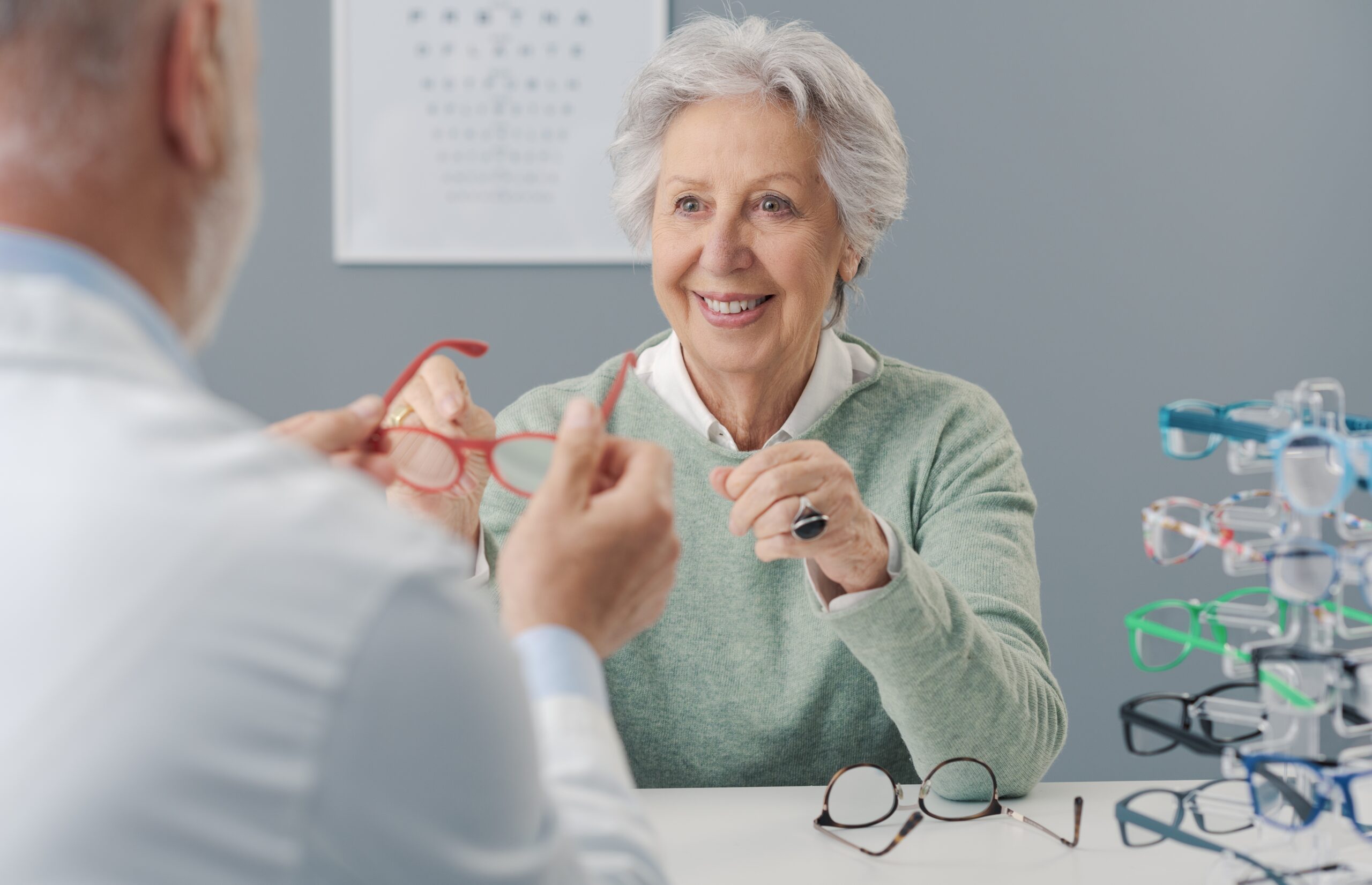Home » Eye Care for Seniors
As we age, maintaining our health becomes increasingly important, and eye care is no exception. Seniors often experience changes in their vision that can impact daily activities, quality of life, and independence. Fortunately, with proper preventative care, regular eye exams, and access to treatments, many eye-related issues can be managed effectively. Equally important is the experience patients have with their optometrists and ophthalmologists—being listened to and having their concerns addressed. Access to a care provider close to home with easy-to-schedule appointments makes a world of difference, especially for seniors.

Preventative care is key to maintaining good eye health and catching problems early. Even if your vision seems fine, age-related eye diseases can develop without symptoms in the beginning stages. By taking a proactive approach, you can help reduce the risk of significant vision loss or blindness later in life.
Some preventative steps seniors can take include:
For seniors, comprehensive eye exams are vital. They are more than just a check on your prescription for glasses or contact lenses—they are a critical tool for diagnosing eye diseases and conditions that could lead to vision loss.
As we age, our eyes undergo changes, and routine eye exams ensure any issues are detected early. It’s recommended that individuals over the age of 65 have a comprehensive eye exam every one to two years. If you have pre-existing conditions like diabetes or high blood pressure, your optometrist or ophthalmologist may recommend more frequent visits.
During an eye exam, your doctor will typically check for:
Seniors are more prone to certain eye conditions due to the natural aging process. Here are some of the most common ones, along with their treatments:
Cataracts cause the lens of the eye to become cloudy, leading to blurry vision, difficulty seeing at night, and increased sensitivity to light. Cataracts develop gradually and are common in individuals over 60. The good news is that cataracts are treatable with surgery. During cataract surgery, the cloudy lens is replaced with an artificial one, restoring clear vision.
AMD affects the macula, the part of the retina responsible for central vision. It can cause blurred vision and difficulty seeing fine details. There are two types: dry AMD and wet AMD. While there is no cure for dry AMD, treatment focuses on slowing its progression through lifestyle changes, vitamins, and dietary supplements. Wet AMD, the more severe form, may require injections or laser therapy to slow its effects.
Glaucoma is an eye disease that damages the optic nerve, often due to high pressure in the eye. It’s one of the leading causes of blindness in older adults. Glaucoma develops slowly, which is why regular eye exams are essential. Treatment usually involves prescription eye drops to reduce eye pressure, but in some cases, surgery or laser therapy may be required.
For seniors with diabetes, diabetic retinopathy is a significant concern. It occurs when high blood sugar damages the blood vessels in the retina, leading to vision loss. Managing blood sugar levels is crucial in preventing diabetic retinopathy. In advanced cases, laser treatment or injections may be needed to reduce further damage to the retina.
Dry eye syndrome is a common condition in seniors, particularly women. It occurs when your eyes do not produce enough tears or the right quality of tears to keep them lubricated. Treatment often includes artificial tears, prescription eye drops, or lifestyle adjustments like using a humidifier or limiting screen time.
One of the most critical aspects of senior eye care is the relationship between the patient and their eye care provider. Seniors often express concerns about not being heard or feeling rushed during medical appointments, and eye care is no exception. It’s important for patients to feel comfortable asking questions and expressing any issues they may be experiencing with their vision.
A compassionate optometrist or ophthalmologist will take the time to:
The importance of communication cannot be overstated. A senior eye care provider should be seen as a partner in managing your vision health. Whether it’s a routine checkup or treatment for a more complex condition, feeling listened to and understood is a vital part of the care experience.
For seniors, convenience and accessibility are crucial when choosing an eye care provider. Long distances, complex transportation arrangements, or difficulty getting appointments can deter individuals from seeking the care they need. That’s why it’s essential to find an eye care provider that’s close to home and easy to get to.
Beyond location, the ease of making appointments is another factor that can significantly improve the care experience for seniors. Look for eye care practices that offer:
Knowing that your eye care provider is nearby and accessible brings peace of mind. It allows seniors to focus on their health rather than the logistics of getting to their appointments.
The goal of senior eye care is to maintain the highest quality of life possible by preserving your vision as much as possible. This means preventing eye diseases before they become serious, managing chronic conditions like diabetes or high blood pressure, and working closely with a knowledgeable eye care provider who listens to you and respects your needs.
At Tennessee Eye Care, we’re dedicated to providing comprehensive and compassionate care for seniors. With convenient locations and a team of optometrists and ophthalmologists who prioritize listening to your concerns, we’re here to help you maintain your eye health. Our main locations in Harriman, Knoxville, Lenoir City, Morristown, and Powell are equipped with state-of-the-art technology and staffed by a team of highly skilled eye care professionals. Contact us today!